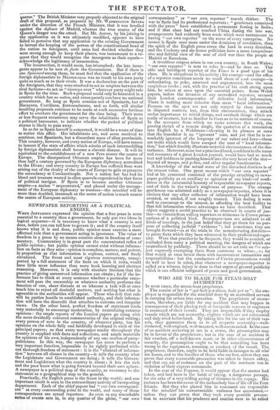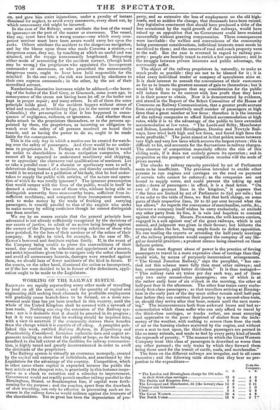WHO ARE TO BLAME FOR STEAM-BOAT ACCIDENTS?
Is most cases, the steam-boat proprietors.
The maxim of law is " qui fecit per alium, fecit per se " : the em- ployer is responsible for the mischief done by an accredited servant in carrying his orders into execution. The proprietors of steam- boats, therefore, are liable for any accident that may happen in consequence of their placing rash or incapable seamen or engineers in command of their vessels. They arc responsible if they employ vessels which are not seaworthy, engines which are not substantial and duly tried beforehand. By taking hire for the use of their ves- sels, they guarantee them as in all respects seaworthy—well- timbered, well-engined, well-manned, well-commanded. In the case of an accident occurring at sea in a storm, the presumption may be in favour of the proprietors ; but in the case of an accident in fair weather, off a well-known coast, or in other circumstances of security, the presumption ought to be that something has been wrong in the equipment, manning, or conduct of the vessel. The proprietors, therefore, ought to be held liable in damages to all who are losers, and to the families of those who are lost, unless they can prove that every reasonable precaution was taken to insure safety, and that any act of rashness on the part of the mariners was in violation of their express commands. In the case of the Pegasus, it would appear that the master had. taken, and had been in the habit of taking, a dangerous passage, for the sake of a very trifling saving of distance in the voyage. His rashness has been the cause of the melancholy loss of life off the Fern Islands. But they who placed him in command are responsible for the mischief his unwarrantable rashness has occasioned,— unless they can prove that they took every possible precau- tion to ascertain that his prudence and caution were to be relied
on, and gave him strict injunctions, under a penalty of instant 'dismissal for neglect, to avoid every manoeuvre, every short cut, by ,which unnecessary risk might be incurred.
In the case of the Solway, some attribute the loss of the vessel to ignorance on the part of the master or steersman. The vessel, they say, must have lain a wrong course—one which every com- petent mariner must have been aware would carry her upon the rocks. Others attribute the accident to the dangerous navigation, and lay the blame upon those who made Corunna a station,—a dangerous coast, they say, by touching at which no useful end was attained, and the voyage unnecessarily lengthened. Supposing either mode of accounting for the accident correct, (though both may be wrong,) the proprietors who appointed the incompetent commander or steersman, or who prescribed the unnecessarily dangerous route, ought to have been held responsible for the mischief. In the one case, the risk was incurred by obedience to their own express commands ; in the other, by the act of their accredited servant.
Numberless illustrative instances might be adduced,—the burst- ing of the boiler of the Earl Grey, at Greenock, some years ago, in consequence of the steam not having been let off, or the boiler not kept in proper repair; and many others. In all of them the same principle holds good. If the accident happen without stress of wind and weather, or bewildering fogs, (as in the recent case of the Columbia,) the presumption is that it has happened in conse- quence of negligence, rashness, or ignorance. And whether these faults attach to the proprietors themselves, or to the persons ap- pointed by them, the proprietors, as incurring an obligation to watch over the safety of all persons received on board their vessels, and as having the power to do so, ought to be made liable for the consequences. This is the only way in which a motive can be created for watch- ing over the safety of passengers. And there would be no unfair- ness to proprietors in it. Perhaps we shall be told that it would be unfair to shareholders in steam navigation companies, who cannot all be expected to understand machinery and shipping, or to appreciate' the character and qualifications of mariners. Let us take a parallel case : if a chemist or apothecary were to sell a deleterious drug instead of a medicine, and thereby occasion death, would it be accepted as a palliation of his fault, that he had under- taken to supply the public with articles, of the nature and opera- tion of which he was totally ignorant ? The ignorant presumption that would tamper with the lives of the public, would in itself be deemed a crime. The case of those who, without being able to distinguish seaworthy from unseaworthy boats, sufficient from in- sufficient machinery, and competent from incompetent mariners, seek to make money by the trade of fetching and carrying passengers, is exactly parallel to that of the empiric who seeks to make money by selling medicines though he caunot distinguish one from another.
We are by no means certain that the general principle here advocated is not already sufficiently recognized by the decisions of our courts of justice, to admit of an action being brought against the owners of the Pegasus by the surviving relations of those who have perished, for the loss of their services or of the solace of their company. It might be tried, for example, in the case of Mr. ELTON'S bereaved and destitute orphan family. If, in the event of the Company being unable to prove the seaworthiness of their vessel, due caution in the selection and appointment of a master, and strict injunctions given him to navigate only the safest channels and avoid all unnecessary hazards, damages were awarded against them, we should hear of fewer accidents of the kind in future. If the courts, on the other hand, dismissed the action as incompetent, or if the law were decided to be in favour of the defendants, appli- cation ought to be made to the Legislature.



























 Previous page
Previous page